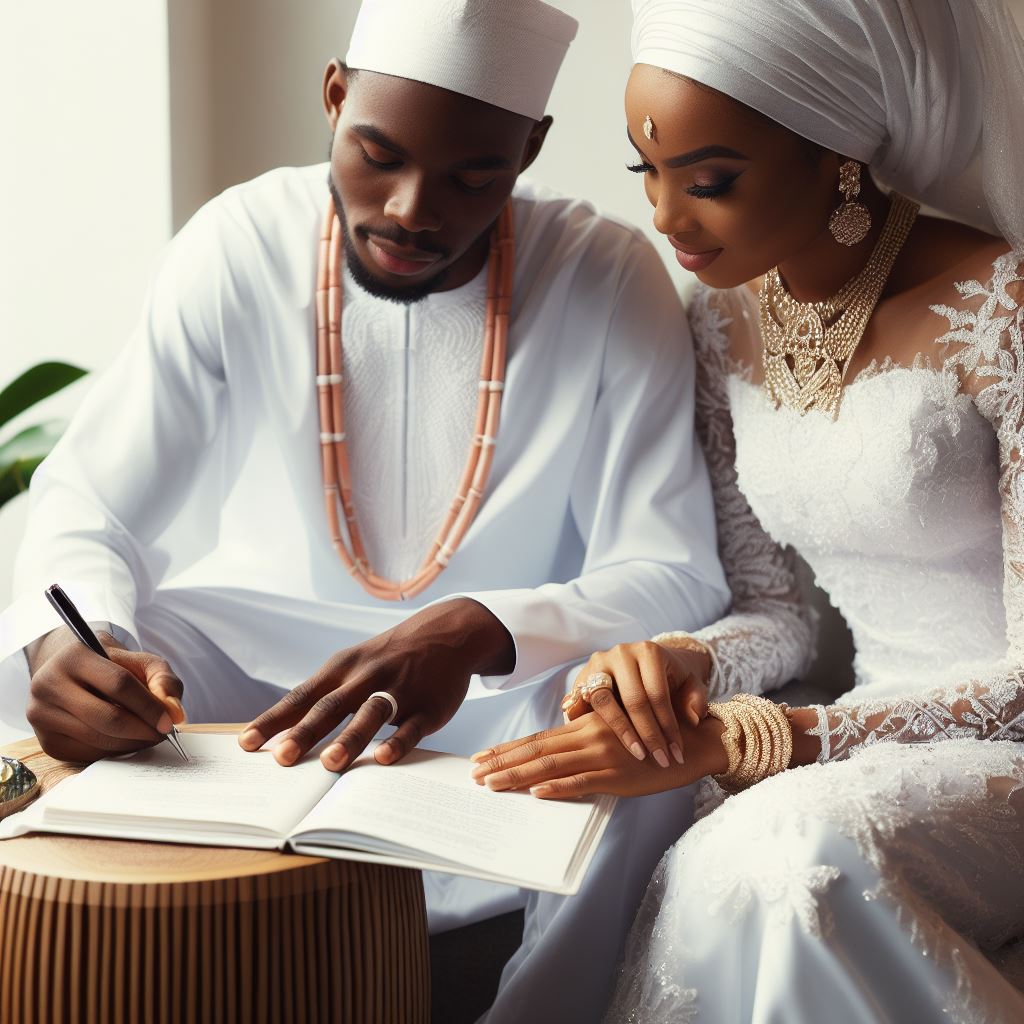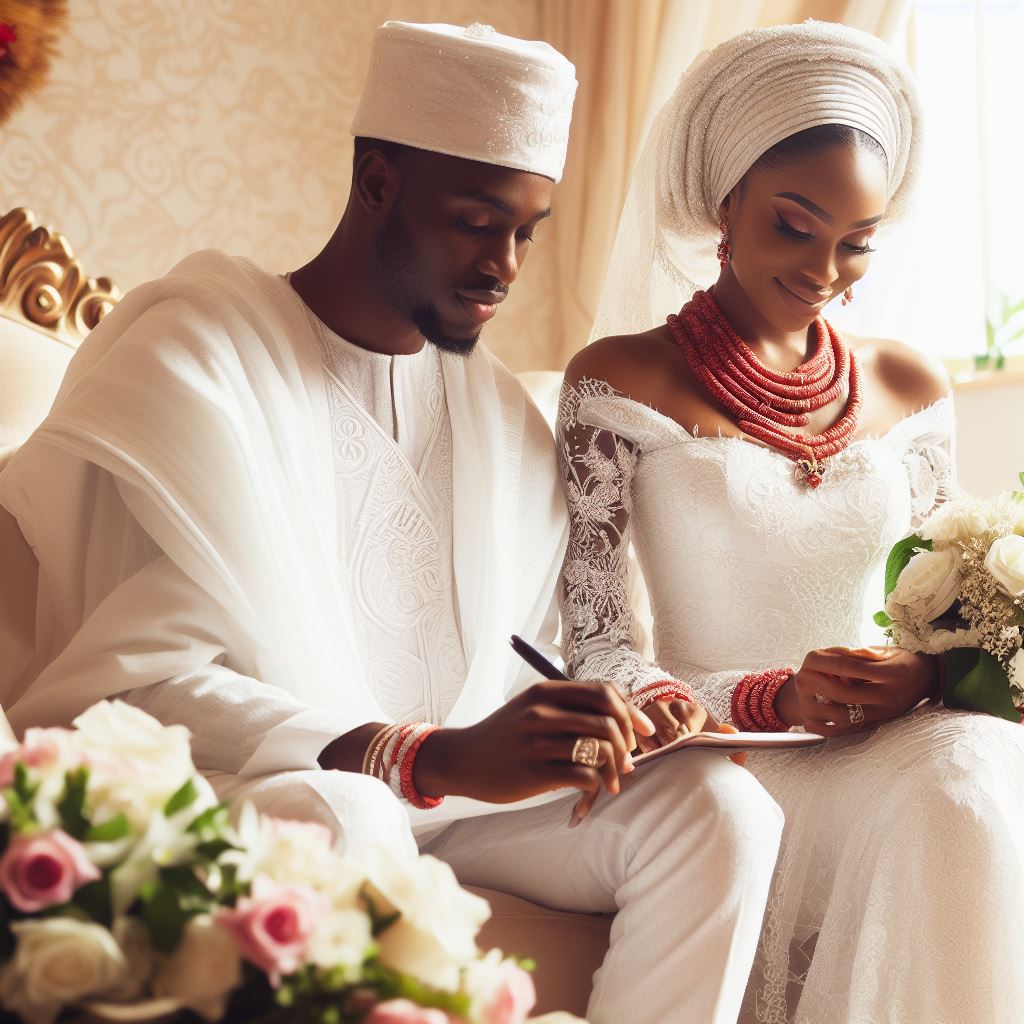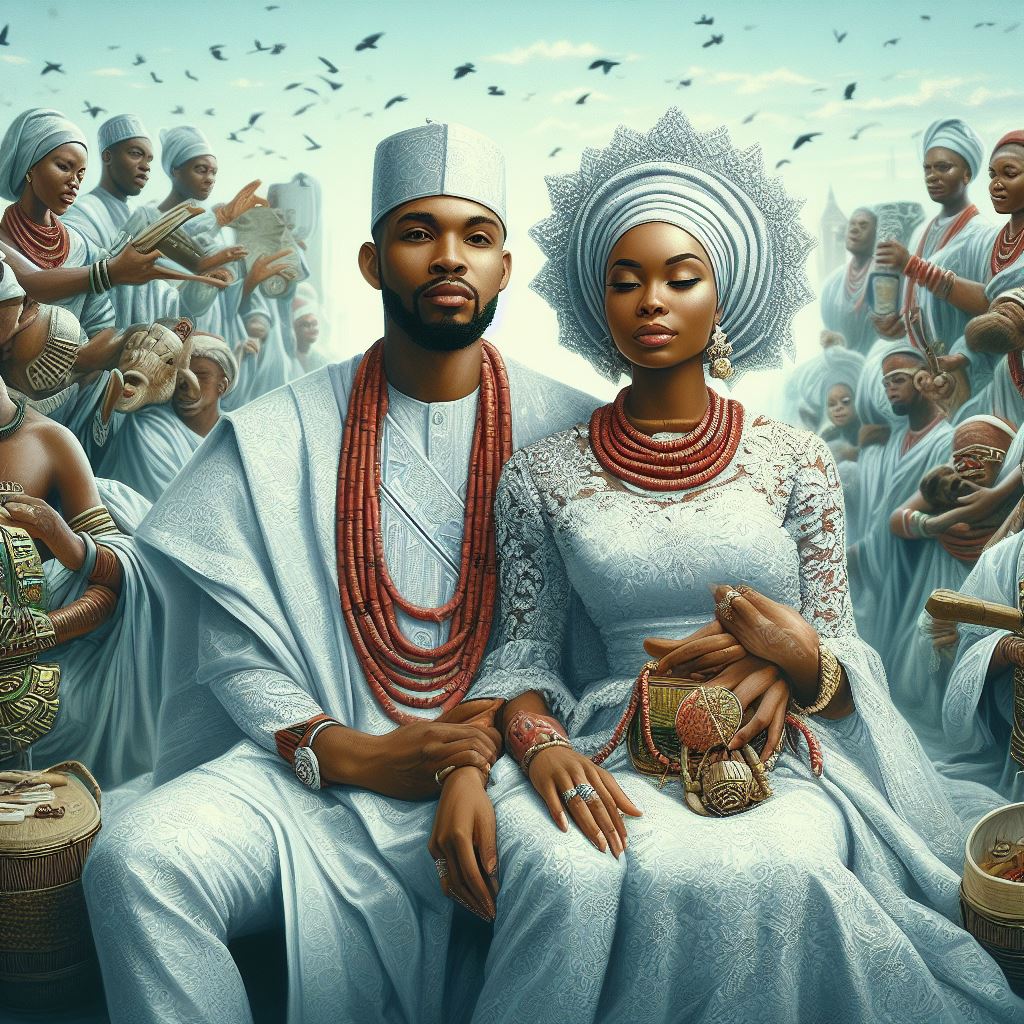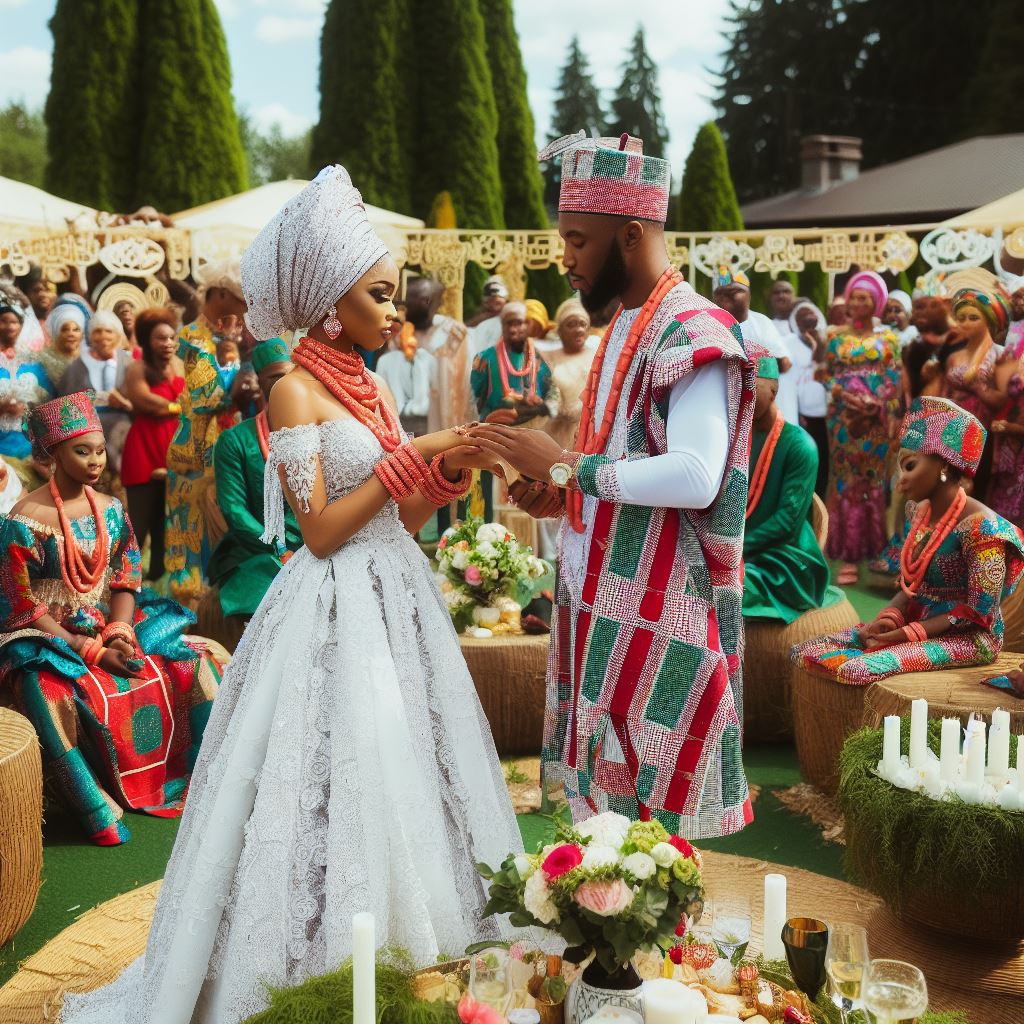Introduction
In Nigeria, marriage stands tall, a cultural and social cornerstone. Religion, a potent force, tightly weaves into the fabric of marital unions.
Christian or Muslim, beliefs shape vows, guide unions, and infuse sacred rites.
Faith instills values, molds perspectives, fostering unity and resilience. Weddings are not mere ceremonies; they are sacred affirmations, entwined with divine blessings.
From vows to family roles, religious doctrines mold the essence of marital life. Prayer becomes a binding force, a constant companion in the journey of togetherness.
The influence is palpable, steering couples through challenges, offering solace, and framing marital bliss within the divine narrative.
In Nigeria, the union of hearts is not only a worldly affair but a spiritual journey, where religion is the compass, navigating the course of wedded life.
Brief overview of marriage in Nigeria
In Nigeria, marriage is not just a union between two individuals but an institution that carries cultural and social significance.
It is a sacred bond that is deeply rooted in the traditions and beliefs of the Nigerian people.
Religion, particularly Christianity and Islam, plays a significant role in shaping the understanding and practice of marriage in Nigeria.
Importance of religion in Nigerian society
Nigerian society places great importance on religious beliefs and practices.
Both Christianity and Islam have a strong presence in the country, and many Nigerians identify themselves as devout followers of these religions.
As a result, religion has a profound influence on various aspects of Nigerian society, including the institution of marriage.
Religious beliefs and teachings shape the expectations and responsibilities within a marriage.
For example, Christianity emphasizes the importance of fidelity, commitment, and mutual love and respect between spouses.
Islam, on the other hand, places emphasis on the roles and responsibilities of spouses as outlined in the Quran.
Religion also influences the process and rituals surrounding marriage in Nigeria.
Traditional wedding ceremonies are often infused with religious practices, prayers, and blessings.
Religious leaders play a vital role in conducting the ceremonies, imparting spiritual guidance, and blessing the union.
Furthermore, religious institutions offer pre-marital counseling and guidance
To couples, emphasizing the importance of religious values and teachings in building a successful marriage.
The religious community provides support and guidance throughout the marriage journey, ensuring that couples adhere to the religious principles of their faith.
Essentially, religion plays a crucial role in the marriage life of Nigerians.
It influences their beliefs, values, and rituals, shaping the understanding and practice of marriage in the country.
The influence of religion on marriage in Nigeria cannot be understated, as it provides a framework for moral and ethical guidelines within the institution of marriage.
Overview of Religion in Nigeria
Dominant religions in Nigeria
- Christianity
- Islam
- Traditional African religions
Significance of religion in Nigerian culture and daily life
Religion plays a significant role in Nigerian culture and daily life, thereby influencing various aspects, including marriage.
Furthermore, Nigeria, a country located in West Africa, is known for its religious diversity.
With a population of over 200 million people, Nigeria is home to a wide range of religious beliefs and practices.
Christianity
Christianity is the most prominent religion in Nigeria, with more than half of the population identifying as Christians.
Christianity was introduced to Nigeria by European missionaries during the colonial era and has since become deeply rooted in Nigerian society.
Churches can be found in almost every corner of the country, and Christian traditions and values have permeated Nigerian culture.
Islam
Islam is the second most popular religion in Nigeria, with a significant Muslim population.
Consequently, Islam was brought to Nigeria by Arab traders and has gained a strong foothold, particularly in the northern regions of the country.
As a result, mosques, Islamic schools, and Islamic religious practices are integral parts of Nigerian Muslim communities.
In addition to Christianity and Islam, Nigeria also has a sizable number of people who practice traditional African religions.
These religions are deeply rooted in the country’s indigenous cultures and include various beliefs and rituals centered around ancestral worship, spirits, and nature.
Despite the influx of Christianity and Islam, traditional religions continue to hold influence in some rural communities.
Notably, religion in Nigeria goes beyond mere spiritual beliefs; it is deeply intertwined with culture and daily life.
As a result, Nigerian society is strongly influenced by religious values, morals, and traditions.
Daily prayers, religious festivals, and adherence to religious laws and practices shape the way Nigerians live their lives.
Marriage in Nigeria
When it comes to marriage in Nigeria, religion plays a crucial role.
Most Nigerians prefer to marry within their religious faith, as religion is seen as a fundamental aspect of identity and compatibility.
Interfaith marriages are less common due to the potential conflicts that may arise from different religious beliefs and practices.
Religious ceremonies and rituals are an important part of Nigerian weddings.
Whether it’s a Christian, Muslim, or traditional African wedding, religious customs and traditions are followed to solemnize the union.
These ceremonies often involve prayers, blessings, and the involvement of religious leaders or clergy members.
Impacts of religion to the dynamics within a marriage.
Christian and Muslim couples, for example, may have different expectations and roles based on their religious teachings.
Religious values shape marital expectations, gender roles, and even decision-making processes within Nigerian marriages.
Overall, religion holds immense power and influence in Nigerian society.
It shapes not only marriage but also various other aspects of people’s lives, including social interactions, governance, and education.
Understanding the influence of religion in Nigerian culture is crucial to gaining a comprehensive understanding of the country and its people.
Read: Marriage Registration in Nigeria: A Step-by-Step Guide
Role of Religion in Marriage in Nigeria
Religious ceremonies and rituals
- Christian weddings
- Muslim weddings
- Traditional African wedding customs
Influence of religious teachings on marital expectations
- Christian perspectives on marriage
- Islamic perspectives on marriage
Religious leaders’ roles in marital counseling and guidance
Religious leaders actively counsel and guide married couples, incorporating spiritual principles and offering pre-marital advice.
They resolve conflicts and provide emotional support.
Read: Bigamy and the Marriage Act: What Every Nigerian Should Know
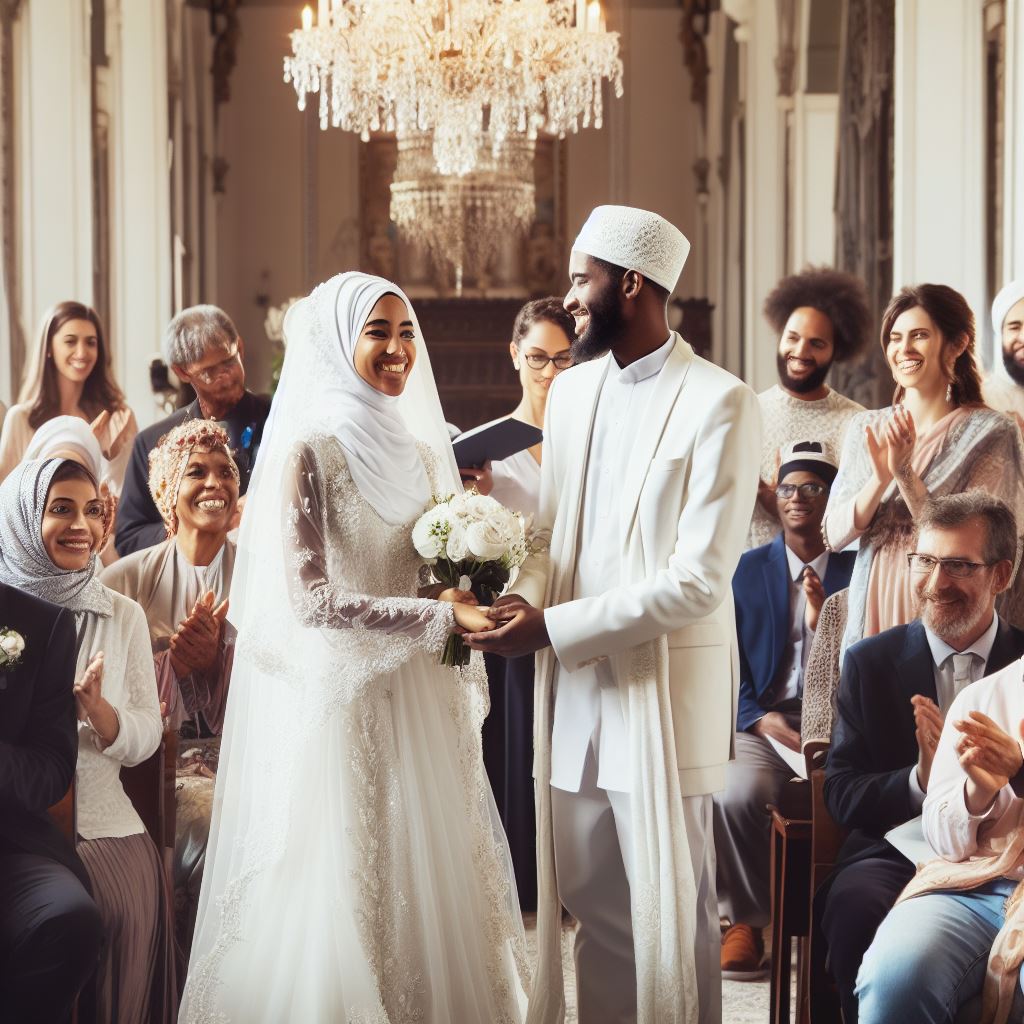
Impact of Religion on Marital Values and Practices
Family planning and contraception
- Religious perspectives on birth control
- Cultural beliefs influencing family planning decisions
Gender roles and marital obligations
- Christian and Islamic views on gender roles
- Traditional customs and gender expectations in marriage
Divorce and marriage dissolution
- Religious attitudes towards divorce
- Cultural factors influencing divorce rates in Nigeria
Religion plays a significant role in shaping the values and practices surrounding marriage in Nigeria.
It influences various aspects of marital life including family planning and contraception, gender roles, and attitudes towards divorce.
These influences arise from both religious perspectives and cultural beliefs intertwined with religious teachings.
Family planning and contraception
1. Religious perspectives on birth control
Religious teachings and doctrines have an impact on the use of contraception among married couples in Nigeria.
For instance, the Catholic Church prohibits the use of artificial birth control methods, advocating instead for natural family planning methods.
On the other hand, some Protestant denominations endorse the use of contraceptives as a responsible choice for couples.
2. Cultural beliefs influencing family planning decisions
Alongside religious perspectives, cultural beliefs and norms also influence family planning decisions in Nigeria.
Some communities value large families as a symbol of prosperity and social status.
As a result, couples may hesitate to use contraception or limit the number of children due to societal pressure and cultural expectations.
Gender roles and marital obligations
1. Christian and Islamic views on gender roles
Christian teachings stress distinct yet complementary roles. Husbands are seen as the household leaders, while wives nurture and care.
On the other hand, Islamic beliefs underscore mutual respect and cooperation.
Spouses are encouraged to uphold specific rights and responsibilities. This promotes a balanced partnership within marriage.
Christianity’s emphasis on gender roles can lead to a hierarchical structure, with the husband as the head.
Meanwhile, Islam promotes a more egalitarian approach, focusing on the importance of harmony and collaboration.
In fact, religion significantly influences the way couples navigate their married lives.
Whether through distinct roles or a more balanced partnership, these religious teachings play a crucial role in shaping marital relationships.
2. Traditional customs and gender expectations in marriage
Traditional customs and cultural expectations also shape gender roles in Nigerian marriages.
In many communities, men are traditionally seen as providers and decision-makers, while women are expected to be submissive and take care of domestic responsibilities.
These expectations can impact marital dynamics and the distribution of responsibilities within the household.
Divorce and marriage dissolution
1. Religious attitudes towards divorce
In Nigeria, religion profoundly shapes views on divorce. Christianity promotes lifelong commitment, discouraging divorce.
Islamic teachings prioritize marriage sanctity but permit divorce in specific situations.
These beliefs discourage divorce, urging couples to overcome marital challenges.
2. Cultural factors influencing divorce rates in Nigeria
Despite religious teachings, divorce rates in Nigeria have been on the rise.
Various cultural factors contribute to this trend, such as increasing urbanization, migration, and exposure to different cultural influences.
Additionally, societal perceptions of gender roles and expectations, economic inequalities, and domestic violence may also play a role in shaping divorce rates.
Therefore, religion has a profound impact on marital values and practices in Nigeria.
It influences family planning decisions, shapes gender roles and obligations within marriage, and has significant implications for divorce rates.
While religious teachings provide a framework for marital life, cultural beliefs and factors also come into play, creating a complex dynamic that shapes the institution of marriage in the Nigerian context.
Read: The Role of Witnesses in Statutory Marriages: Nigeria’s Perspective
Challenges and Benefits of Religious Influence on Marriage in Nigeria
Controversies surrounding interfaith marriages
- Religious differences often lead to conflicts and disagreements in interfaith marriages.
- Strategies for navigating interfaith relationships are crucial for harmony and understanding.
Benefits of religious guidance and principles
- Religious influence strengthens commitment and fidelity in marriages.
- Moral values and ethical foundations provided by religion contribute to a healthy marriage life.
In Nigeria, the influence of religion on the institution of marriage cannot be underestimated.
Religion plays a significant role in shaping the beliefs, attitudes, and practices of individuals regarding marriage and family life.
While religious influence can bring numerous benefits to marriages, it also presents certain challenges that need to be addressed.
Controversies surrounding interfaith marriages
1. Religious differences and conflict
In a country as diverse as Nigeria, interfaith marriages are quite common.
However, these unions are not without their challenges.
The differing beliefs, rituals, and practices of the partners can lead to conflicts and misunderstandings.
Disagreements over religious rituals, celebrations, and even child-rearing practices can create tensions in the relationship.
Couples must find a way to respect and appreciate each other’s religious backgrounds to navigate through these challenges.
2. Strategies for navigating interfaith relationships
To ensure a harmonious interfaith marriage, couples need to develop effective strategies.
Open communication, understanding, and compromise are key.
Couples should engage in respectful discussions about their religious beliefs, seeking common ground and finding ways to incorporate both traditions into their married life.
Seeking guidance from religious leaders who advocate for tolerance and understanding can also be beneficial.
Benefits of religious guidance and principles
1. Strengthening commitment and fidelity
Religious teachings often emphasize the importance of commitment and fidelity in marriage.
The belief in a higher power and the accountability that comes with it can strengthen the bond between spouses and discourage behaviors that could harm the marriage.
The fear of divine punishment and the desire for spiritual growth can motivate individuals to stay faithful to their partners, fostering trust and loyalty within the marriage.
2. Moral values and ethical foundations
Religion provides a moral compass and ethical framework that guides individuals’ behavior within the marriage.
The teachings of most religions promote virtues such as honesty, kindness, forgiveness, and patience.
These values form the foundation of a healthy and thriving marriage.
Religious principles also provide guidance on issues like resolving conflicts, raising children, and managing finances, contributing to a more fulfilling and purposeful marital relationship.
Generally, the influence of religion on marriage in Nigeria presents both challenges and benefits.
Interfaith marriages often face controversies due to religious differences, but with strategies for understanding and compromise, these unions can thrive.
The benefits of religious guidance include strengthened commitment, fidelity, and the establishment of moral values and ethical foundations.
By navigating the challenges and embracing the benefits, couples in Nigeria can build successful and fulfilling marriages under the influence of religion.
Read: Marriage Act in Nigeria: Implications for Interfaith Couples
Delve into the Subject: Celebrating Love: A Guide to Nigerian Wedding Toasts
Uncover the Details: Bridging Cultural Gaps: Prayers for Intertribal Nigerian Marriages
Conclusion
Recap of the influence of religion on marriage life in Nigeria
In Nigeria, religion profoundly shapes marital dynamics. Consequently, beliefs dictate choices, guiding unions with spiritual significance.
Moreover, religious practices intertwine, shaping daily marital rituals. Furthermore, doctrines form a moral compass, influencing decisions and resolving conflicts within marriages.
Additionally, faith often molds societal expectations, setting standards for marital conduct. Consequently, shared religious values foster unity, providing couples with a common ground for understanding.
Furthermore, spiritual guidance becomes a cornerstone, offering solace during challenges. Additionally, marital ceremonies often reflect religious customs, marking the union with sacred rites.
Moreover, the divine aspect adds a profound depth to marital commitments, reinforcing the sanctity of the bond. Through prayer and shared faith, couples find strength, fortifying their connection.
In review, religion permeates every facet of Nigerian marital life, offering a framework for love, commitment, and enduring partnership.
Importance of understanding the interplay between religion, culture, and marriage
It is crucial to recognize the interplay between religion, culture, and marriage in Nigeria.
Understanding these dynamics allows for a better comprehension of the challenges and opportunities faced by individuals in their marriages.
Final thoughts on the evolving role of religion in Nigerian marriages
As Nigerian society continues to evolve, the role of religion in marriages also undergoes changes.
Moreover, while religion remains a guiding force, couples are finding ways to incorporate modern values and practices into their unions.
Religion in Nigeria goes beyond mere beliefs; it influences marital rituals, expectations, and even the distribution of power within the family.
Furthermore, such influences can be positive, promoting stability and commitment, but they can also be restrictive, limiting individual freedoms and choices.
As Nigerians navigate the complexities of modern-day marriages, an open and inclusive understanding of religion’s role is crucial.
This involves recognizing the need for flexibility and adaptation while still preserving cultural and religious values.
In the end, the influence of religion on marriage life in Nigeria is undeniable.
Consequently, it shapes the way couples approach marriage, navigate challenges, and find meaning in their unions.
Ultimately, understanding the interplay between religion, culture, and marriage is key to ensuring successful and fulfilling marriages in the Nigerian context.

